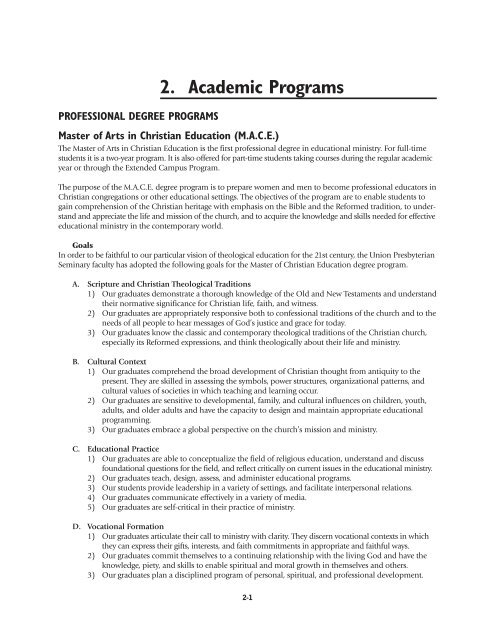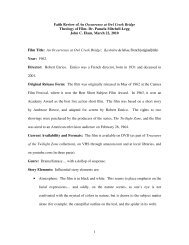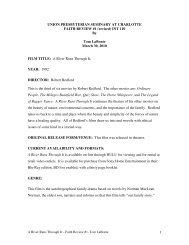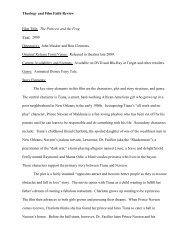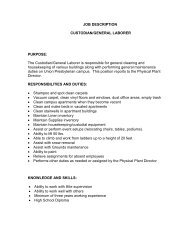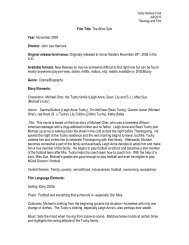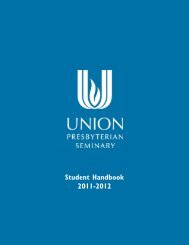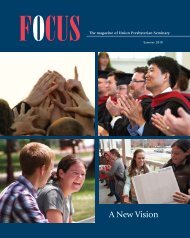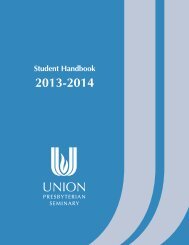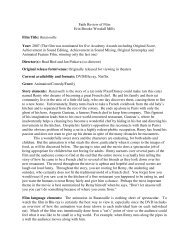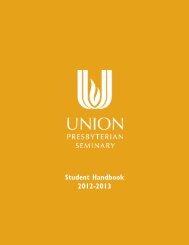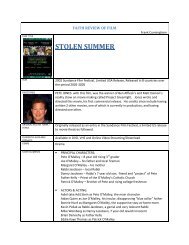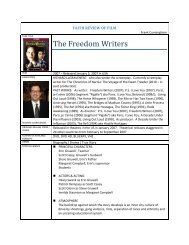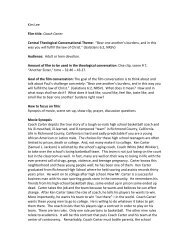Academic Catalog 2010-2011 - Union Presbyterian Seminary
Academic Catalog 2010-2011 - Union Presbyterian Seminary
Academic Catalog 2010-2011 - Union Presbyterian Seminary
You also want an ePaper? Increase the reach of your titles
YUMPU automatically turns print PDFs into web optimized ePapers that Google loves.
PROFESSIONAL DEGREE PROGRAMS2. <strong>Academic</strong> ProgramsMaster of Arts in Christian Education (M.A.C.E.)The Master of Arts in Christian Education is the first professional degree in educational ministry. For full-timestudents it is a two-year program. It is also offered for part-time students taking courses during the regular academicyear or through the Extended Campus Program.The purpose of the M.A.C.E. degree program is to prepare women and men to become professional educators inChristian congregations or other educational settings. The objectives of the program are to enable students togain comprehension of the Christian heritage with emphasis on the Bible and the Reformed tradition, to understandand appreciate the life and mission of the church, and to acquire the knowledge and skills needed for effectiveeducational ministry in the contemporary world.GoalsIn order to be faithful to our particular vision of theological education for the 21st century, the <strong>Union</strong> <strong>Presbyterian</strong><strong>Seminary</strong> faculty has adopted the following goals for the Master of Christian Education degree program.A. Scripture and Christian Theological Traditions1) Our graduates demonstrate a thorough knowledge of the Old and New Testaments and understandtheir normative significance for Christian life, faith, and witness.2) Our graduates are appropriately responsive both to confessional traditions of the church and to theneeds of all people to hear messages of God’s justice and grace for today.3) Our graduates know the classic and contemporary theological traditions of the Christian church,especially its Reformed expressions, and think theologically about their life and ministry.B. Cultural Context1) Our graduates comprehend the broad development of Christian thought from antiquity to thepresent. They are skilled in assessing the symbols, power structures, organizational patterns, andcultural values of societies in which teaching and learning occur.2) Our graduates are sensitive to developmental, family, and cultural influences on children, youth,adults, and older adults and have the capacity to design and maintain appropriate educationalprogramming.3) Our graduates embrace a global perspective on the church’s mission and ministry.C. Educational Practice1) Our graduates are able to conceptualize the field of religious education, understand and discussfoundational questions for the field, and reflect critically on current issues in the educational ministry.2) Our graduates teach, design, assess, and administer educational programs.3) Our students provide leadership in a variety of settings, and facilitate interpersonal relations.4) Our graduates communicate effectively in a variety of media.5) Our graduates are self-critical in their practice of ministry.D. Vocational Formation1) Our graduates articulate their call to ministry with clarity. They discern vocational contexts in whichthey can express their gifts, interests, and faith commitments in appropriate and faithful ways.2) Our graduates commit themselves to a continuing relationship with the living God and have theknowledge, piety, and skills to enable spiritual and moral growth in themselves and others.3) Our graduates plan a disciplined program of personal, spiritual, and professional development.2-1


